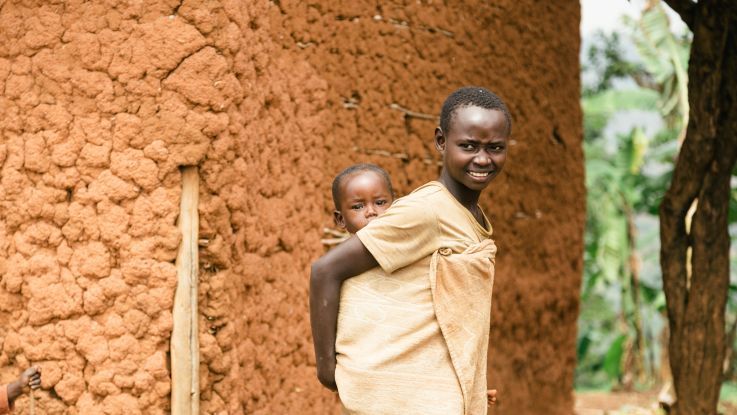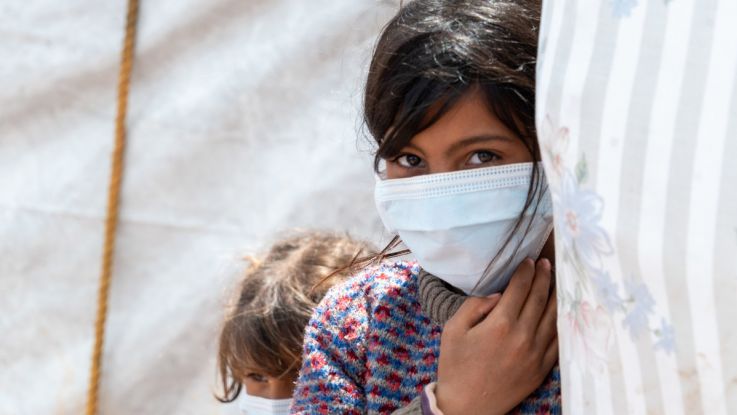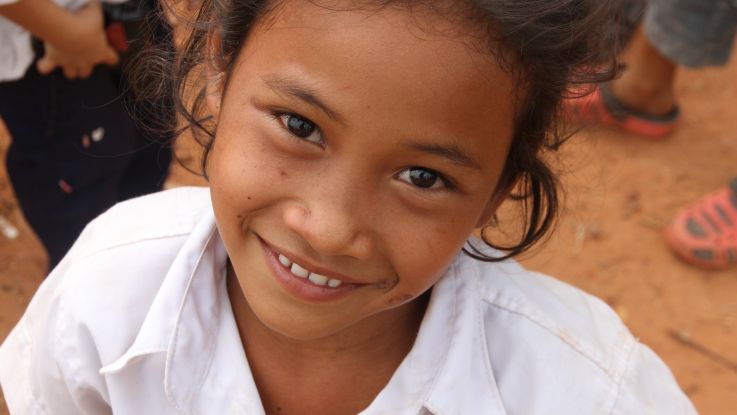Bangladesh
Why we work in Bangladesh
Poverty is deep and widespread in Bangladesh and it is made worse by the exploitation of women and girls, and the impacts of extreme weather like cyclones and hurricanes.
Cases of violence against women are very high, especially rape, acid attacks, and child trafficking. Around 400 women and children fall victim to trafficking each month in Bangladesh. Most of them are between 12 and 16 and are forced to work in the commercial sex industry.4
Approximately 990 girls aged under 18 reported being raped between 2003 and 2008, while stigma and an unreliable justice system prevents many girls from reporting their experiences to the police and getting the support they need.5
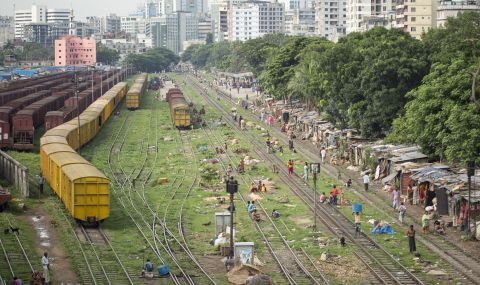
A busy slum beside a railway in Dhaka - one of many dangerous slums where girls are vulnerable to violence and exploitation.
What we do in Bangladesh
ActionAid works in both rural and urban parts of Bangladesh, supporting the most vulnerable women and children to protect themselves from violence, access their right to education, and increase their resilience to the effects of climate change.
Keeping girls safe from harm
Girls in Bangladesh are particularly vulnerable to violence and exploitation, including sexual abuse and harassment, forced marriage, forced labour, and trafficking. We work with 62 partner organisations to help the most vulnerable women and girls.
Our local staff searches the streets of Dhaka to find girls in possible danger and bring them to a safe space at one of our five 'Happy Homes'. Here ActionAid girls can receive healthy food, emotional support, access to education, and life skills. More than 17,000 girls have already been helped.
Through funding from child sponsorship, we also fund child spaces in Dhaka slums where girls and their mothers can come to learn about their legal rights and to gain the confidence to challenge attitudes that allow violence to flourish.
Adapting to climate change
We support women living on the margins of survival to prepare and adapt to climate change. We build flood-proof villages, provide salt-resistant seeds, teach children how to survive in a disaster, and build child-friendly spaces where they can continue their studies when the route to school is flooded. We also help local women’s groups develop innovative farming techniques and campaign for stronger embankments.
Improving workers’ rights
Through training and support, we make people aware of their rights to health care, clean water, education, and safe working conditions. We support nearly 200,000 female workers in garment factories around the country, by teaching them about labour laws and giving them the confidence and skills to stand up to their managers and demand their rights.
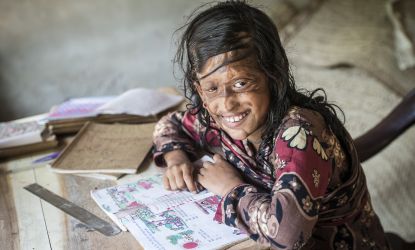
Providing support to survivors of violence
Khodaja was 15 when she, and her 18-day-old daughter Sonali, were attacked with acid over a land dispute. Both their faces were severely disfigured.
As well as practical support including medical care and Sonali’s school fees, ActionAid has helped them cope with the trauma through counselling, giving them the confidence to reintegrate into society.
We should be treated with respect and honour in the same way we were treated before the attack."
Find out more about the impacts of acid attacks on women and girls
Sonali was just 18 days old when she and her mother were attacked with acid while asleep at home in Bangladesh
Nicola Bailey/ActionAid
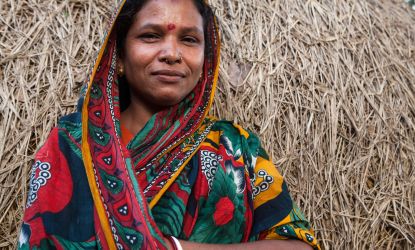
Sabita Rani, 38, is her village's emergency response woman leader in the Kalapara Sub-district in southern Bangladesh.
Mahmud /MAP/ActionAid
Training women to lead emergency responses
Sabita, 38, was trained by ActionAid to be her village's emergency response woman leader in the Kalapara sub-district in southern Bangladesh.
When Tropical Storm Mahasen struck in 2013, she was ready to warn the community and assist them to reach the storm shelter. She worked with the other women in her group to get 500 people to safety. She loves the fact that the women worked together and she is proud of their approach.
We went to people's houses and explained to them that the storm was coming. We asked, 'Will you be able to get to the shelter alone? How can we help you?’ This way they felt encouraged and less scared about the storm".
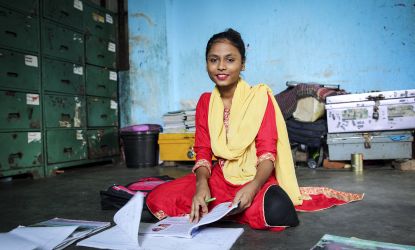
Helping girls off the streets
10-year-old Jesmin used to live on the streets of Dhaka, Bangladesh. Her family was so poor they barely had anything to eat.
Now Jesmin lives in an ActionAid funded 'Happy Home' - where she can enjoy a proper meal, learn and play with other girls, and gain skills for the future, safe from harm.
“When I used to live on the street, boys used bad words against me and they were beating me,” Jesmin said. "So my understanding is girls are not safe on the streets."
"Now I love living in Happy Homes. I can eat healthy food regularly. I’ve learned to make necklaces, bracelets, anklets and I can do embroidery. And I can study. I am in class 5. My favorite subject is Social Science and English."
Jesmin 10, studying at an ActionAid-supported Happy Home, where she has been living for the last five years, in Dhaka, Bangladesh.
G.M.B. Akash/Panos/ActionAid
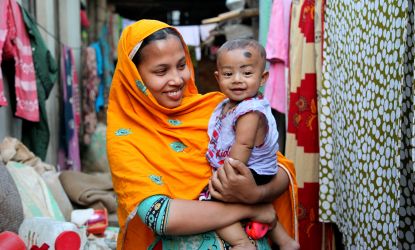
Nazma and her baby who survived the Rana Plaza factory collapse
ActionAid
Fighting for garment workers' rights
Nazma and her baby son escaped the Rana Plaza factory collapse, but tragically Nazma’s husband was killed. “He was my all-time shelter, like a banyan tree,” she told us.
We helped Nazma with emergency aid, medical care, and counseling, and we’re also advocating for better and safer working conditions to make sure a tragedy like this doesn’t happen again.
We’ve set up 'Rights Cafes' next to many factories, which provide a safe space for women workers to learn about labour laws and gain the confidence they need to demand their rights from their employers.
Find out how coronavirus is affecting women in informal sectors
Footnotes
- 1 https://databankfiles.worldbank.org/public/ddpext_download/poverty/987B9C90-CB9F-4D93-AE8C-750588BF00QA/current/Global_POVEQ_BGD.pdf
- 2 https://asiapacific.unwomen.org/sites/default/files/Field%20Office%20ESEAsia/Docs/Misc/2020/03/bd-Fact-sheet-Formal.pdf
- 3 https://asiapacific.unwomen.org/sites/default/files/Field%20Office%20ESEAsia/Docs/Misc/2020/03/bd-Fact-sheet-Formal.pdf
- 4'Human trafficking in Bangladesh', UNCDO(2015)
- 5'Women and the City', ActionAid report (2015)
Page updated 10 January 2025

